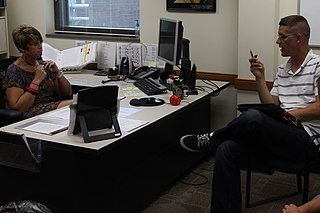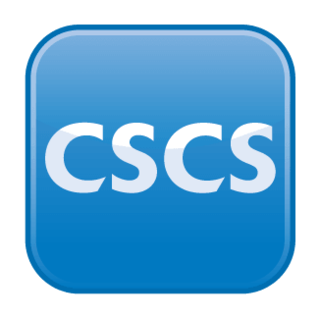Esco or ESCO may refer to:
Esco or ESCO may refer to:
Amp or AMP may refer to:

Training is teaching, or developing in oneself or others, any skills and knowledge or fitness that relate to specific useful competencies. Training has specific goals of improving one's capability, capacity, productivity and performance. It forms the core of apprenticeships and provides the backbone of content at institutes of technology. In addition to the basic training required for a trade, occupation or profession, training may continue beyond initial competence to maintain, upgrade and update skills throughout working life. People within some professions and occupations may refer to this sort of training as professional development. Training also refers to the development of physical fitness related to a specific competence, such as sport, martial arts, military applications and some other occupations.
EMP or Emp may refer to:
National Vocational Qualifications (NVQs) are practical work-based awards in England, Wales and Northern Ireland that are achieved through assessment and training. The regulatory framework supporting NVQs was withdrawn in 2015 and replaced by the Regulated Qualifications Framework (RQF), although the term "NVQ" may be used in RQF qualifications if they "are based on recognised occupational standards, work-based and/or simulated work-based assessment and where they confer occupational competence".
MSC may refer to:

Professional diving is underwater diving where the divers are paid for their work. The procedures are often regulated by legislation and codes of practice as it is an inherently hazardous occupation and the diver works as a member of a team. Due to the dangerous nature of some professional diving operations, specialized equipment such as an on-site hyperbaric chamber and diver-to-surface communication system is often required by law, and the mode of diving for some applications may be regulated.

The MS Estonia was a cruiseferry built in 1980 for the Finnish company Rederi Ab Sally by Meyer Werft, in Papenburg, West Germany. She was employed on ferry routes between Finland and Sweden by various companies until 1993, when she was sold to Nordström & Thulin for use on Estline's Tallinn–Stockholm route. The ship's sinking on 28 September 1994, in the Baltic Sea between Sweden, Finland and Estonia, was one of the worst peacetime maritime disasters of the 20th century, claiming 852 lives.

Tallink is an Estonian shipping company operating Baltic Sea cruiseferries and ropax ships from Estonia to Finland, Estonia to Sweden and Finland to Sweden. It is the largest passenger and cargo shipping company in the Baltic Sea region. It owns Silja Line and a part of SeaRail. Tallink Hotels runs four hotels in Tallinn. It is also the co-owner of a taxi company Tallink Takso.

MS Regina Baltica is a cruiseferry owned by the Estonian shipping company Tallink. She was built in 1980 as Viking Song by Wärtsilä Perno shipyard, Finland for Rederi Ab Sally, one of the owners of the Viking Line consortium. She has also sailed under the names Braemar and Anna Karenina.
A national qualifications framework (NQF) is a formal system describing qualifications. 47 countries participating in the Bologna Process are committed to producing a national qualifications framework. Other countries not part of this process also have national qualifications frameworks.
Recognition of prior learning (RPL), prior learning assessment (PLA), or prior learning assessment and recognition (PLAR), describes a process used by regulatory bodies, adult learning centres, career development practitioners, military organizations, human resources professionals, employers, training institutions, colleges and universities around the world to evaluate skills and knowledge acquired outside the classroom for the purpose of recognizing competence against a given set of standards, competencies, or learning outcomes. RPL is practiced in many countries for a variety of purposes, for example an individual's standing in a profession, trades qualifications, academic achievement, recruitment, performance management, career and succession planning.

A cleaner or a cleaning operative is a type of industrial or domestic worker who does the cleaning.
An energy service company (ESCO) is a company that provides a broad range of energy solutions including designs and implementation of energy savings projects, retrofitting, energy conservation, energy infrastructure outsourcing, power generation, energy supply, and risk management.

Career counseling is a type of advice-giving and support provided by career counselors to their clients, to help the clients manage their journey through life, learning and work changes (career). This includes career exploration, making career choices, managing career changes, lifelong career development and dealing with other career-related issues. There is no agreed definition of career counseling worldwide, mainly due to conceptual, cultural and linguistic differences. However, the terminology of 'career counseling' typically denotes a professional intervention which is conducted either one-on-one or in a small group. Career counseling is related to other types of counseling. What unites all types of professional counseling is the role of practitioners, who combine giving advice on their topic of expertise with counseling techniques that support clients in making complex decisions and facing difficult situations.

N-acetyltransferase ESCO2, also known as establishment of cohesion 1 homolog 2 or ECO1 homolog 2, is an enzyme that in humans is encoded by the ESCO2 gene.
DISCO – European Dictionary of Skills and Competences is a structured vocabulary for the description of skills and competences in different contexts such as labour market, education, and training, and the recognition of qualifications. DISCO provides a skills and competences classification that is neither linked to occupations nor to qualifications. Instead it functions as a thesaurus of skills and competences which is based on existing international standards and classifications and thus represents a terminological basis for the description of skills and competences, occupations as well as personal skill profiles and CVs, job vacancies, and job requirements or for describing curricula, courses, Diploma and Certificate Supplements or learning outcomes in general. Available in ten language versions, DISCO is meant to support transnational comparability of competences acquired in an educational or work context throughout Europe.

Diver training is the set of processes through which a person learns the necessary and desirable skills to safely dive underwater within the scope of the diver training standard relevant to the specific training programme. Most diver training follows procedures and schedules laid down in the associated training standard, in a formal training programme, and includes relevant foundational knowledge of the underlying theory, including some basic physics, physiology and environmental information, practical skills training in the selection and safe use of the associated equipment in the specified underwater environment, and assessment of the required skills and knowledge deemed necessary by the certification agency to allow the newly certified diver to dive within the specified range of conditions at an acceptable level of risk. Recognition of prior learning is allowed in some training standards.
Connor Olev Martin O'Brien is a Canadian alpine skier, businessman, and investor. He is president and chief executive officer of O'Shares Investments, a U.S.-based ETF adviser, as well as president, chief executive officer and chief investment officer of Stanton Asset Management, a Montreal-based investment-management company, which he founded in 2002. O'Brien had previously established a private-equity investment firm, Stanton Capital Corporation, in New York City. Before establishing his own businesses, he held positions at Merrill Lynch and Lehman Brothers.
European Skills, Competences, Qualifications and Occupations (ESCO) is a multilingual classification that identifies and categorises skills, competences, qualifications and occupations relevant for the EU labour market and education. ESCO has been developed by The European Commission since 2010.

The Construction Skills Certification Scheme (CSCS) is a British company that runs a training and qualification verification scheme of the same name for the British construction industry. CSCS is the leading skills certification scheme within the UK construction industry and CSCS cards provide proof that individuals working on construction sites have the appropriate training and qualifications for the job they do on site. By ensuring the workforce are appropriately qualified the card plays its part in improving standards and safety on UK construction sites. Holding a CSCS card is not a legislative requirement. It is entirely up to the principal contractor or client whether workers are required to hold a card before they are allowed on site. However, most principal contractors and major house builders require construction workers on their sites to hold a valid card.